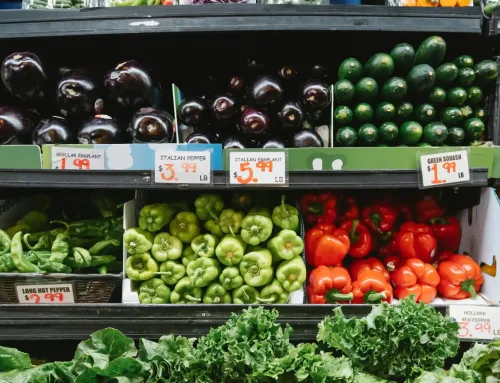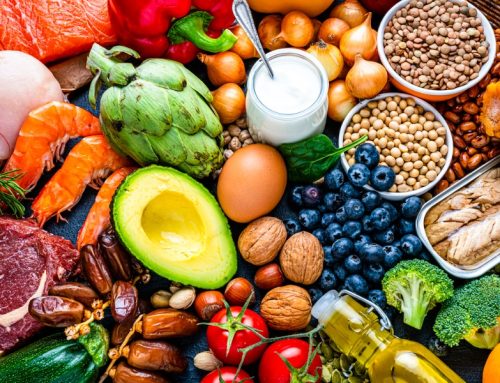Pregnancy is an incredible journey, and what you eat plays a crucial role in ensuring both your health and that of your baby.
This guide will take you through the essential dietary choices from the first trimester to delivery, highlighting which foods to embrace and which ones to avoid for optimal nutrition.
Discover the key nutrients needed during each stage of your pregnancy and how to manage cravings while maintaining a balanced diet.
Your path to a healthy pregnancy starts here!
Key Takeaways:
- Incorporate a variety of nutrient-rich foods in your diet for a healthy first trimester, including lean proteins, fruits, vegetables, and whole grains.
- During the second trimester, focus on maintaining a balanced diet and managing cravings by choosing healthy options like snacks with protein and whole grains.
- In the third trimester, prioritize foods high in essential nutrients like calcium, iron, and folate to nourish your body and prepare for delivery.
- Stay hydrated by drinking plenty of water and incorporating hydrating foods like fruits and vegetables.
First Trimester: What to Eat for a Healthy Pregnancy
The first trimester is a crucial period in pregnancy, where a healthy diet becomes essential for both the mother and the developing baby. During this time, prioritizing nutrient-dense foods can help ensure that you’re meeting your increased caloric and nutritional needs while managing symptoms like morning sickness. It’s important to focus on incorporating a variety of food groups, including lean proteins, whole grains, fruits, and vegetables, while also being mindful of hydration and appropriate portion sizes.
What Foods to Avoid During the First Trimester?
During the first trimester of pregnancy, certain foods should be avoided to protect the health of both the mother and the developing fetus. Common culprits include extremely spicy foods, raw foods, processed foods, and those high in sugar or caffeine, which can potentially lead to complications or increased morning sickness. It’s essential for expecting mothers to be aware of food safety guidelines and to consult with their healthcare provider regarding dietary restrictions.
To further enhance the health of both mother and child, it is crucial to avoid specific categories of foods that may pose risks. High-mercury fish, such as shark, swordfish, and king mackerel, can lead to developmental issues for the fetus, as mercury exposure is linked to neurological damage. Raw or undercooked meats may carry harmful bacteria, increasing the likelihood of foodborne illnesses which are particularly dangerous during pregnancy. Instead, opting for safer alternatives like salmon, which is low in mercury and high in omega-3 fatty acids, or well-cooked poultry can provide necessary nutrients without the associated risks.
- High-Mercury Fish:
- Shark
- Swordfish
- King Mackerel
By steering clear of these foods and focusing on a balanced diet rich in fruits, vegetables, whole grains, and lean proteins, expectant mothers can help ensure a healthier pregnancy.
What Nutrients Are Important for a Healthy Pregnancy in the First Trimester?
In the first trimester of pregnancy, certain nutrients become paramount for the health of both the mother and the developing baby, with folic acid emerging as one of the most critical. Adequate intake of iron, calcium, and protein is essential for supporting fetal growth and development, while vitamin C and DHA contribute to overall health and wellness. Incorporating a diverse array of healthy foods can help meet these nutritional requirements effectively.
To ensure optimal health during this crucial time, it’s vital to examine these nutrients closely.
- Folic Acid: This B vitamin plays a key role in preventing neural tube defects. Foods rich in folate include leafy greens, fortified cereals, and legumes.
- Iron: Essential for oxygen transport, iron supports increased blood volume in pregnancy. Red meat, beans, and spinach are excellent sources.
- Calcium: Needed for fetal bone development, calcium can be found in dairy products, almonds, and fortified plant milks.
- Protein: Crucial for tissue building, lean meats, eggs, and quinoa provide ample protein.
- Vitamin C: This antioxidant aids iron absorption and promotes a healthy immune system. Citrus fruits, strawberries, and bell peppers are great options.
- DHA: Essential for brain development, DHA is found in fatty fish, walnuts, and algae supplements.
Incorporating these nutrient-rich foods into meals can be as simple as adding leafy greens to smoothies or preparing a delicious stir-fry with lean protein and colorful vegetables, ensuring both mothers and babies thrive.
Further reading: Holistic Diets Explained: What They Are and Simple Examples
Second Trimester: Maintaining a Healthy Diet for Pregnancy
In the second trimester of pregnancy, maintaining a healthy diet is vital as the body undergoes significant changes and the baby’s growth accelerates. During this period, a focus on balanced meals that include all food groups is essential to meet the increased energy needs and to support the developing fetus. Pregnant women may experience cravings and changes in appetite, making it important to create a flexible meal plan that accommodates these fluctuations while ensuring adequate hydration and nutrient intake.
What Are the Best Foods to Eat During the Second Trimester?
The second trimester is an ideal time to focus on incorporating the best foods that support a healthy pregnancy. Nutrient-dense options such as lean meats, dairy products, a variety of fruits and vegetables, and whole grains are essential for providing the necessary vitamins and minerals that aid in fetal development and maternal health. Healthy snacks can help manage hunger and maintain energy levels throughout the day.
In this phase, pregnant women should consider adding dark leafy greens like spinach and kale to their meals, as they are rich in folate, which is crucial for the baby’s neural development. Incorporating fatty fish, such as salmon, can provide important omega-3 fatty acids, known to support brain development.
For those with sweet cravings, seasonal fruits such as apples, pears, and berries can be nutritious snacks. Not only do these options offer essential vitamins, but they also provide fiber, which aids digestion.
- Preparation Tips:
- Steam or sauté leaf greens to retain their nutrients while enhancing their flavor.
- Grill or bake fish, seasoning lightly with herbs and lemon for a healthy meal.
- Enjoy fruits raw, or mix them into smoothies for a refreshing boost.
By diversifying the diet with these nutritious options, expectant mothers can optimize their health and the development of their child during this critical stage.
How Can You Cope with Pregnancy Cravings?
Coping with pregnancy cravings, which often peak during the second trimester, requires a strategic approach to ensure that the choices made are healthy and beneficial for both mother and baby. While cravings can lead to emotional eating or preferences for unhealthy options, it’s important to focus on portion sizes and healthy snacks that satisfy cravings without compromising nutritional needs.
To effectively manage cravings during this critical time, individuals can adopt a variety of effective strategies.
- Incorporating more fruits and vegetables into snacks can curb desires for processed items.
- Many find that keeping pre-portioned healthy alternatives, such as nuts or yogurt, readily available is beneficial.
- Mindful eating practices can also help by concentrating on the experience of eating, thus reducing the temptation to indulge excessively.
Meal prep plays a crucial role in maintaining a healthy diet; by planning ahead, one can ensure that meals are both nutritious and satisfying.
Stocking the pantry with wholesome staples, like whole grains and canned legumes, allows for the quick assembly of meals that can fulfill those cravings while providing essential nutrients.
What Are the Essential Nutrients for a Healthy Pregnancy in the Second Trimester?
During the second trimester of pregnancy, several essential nutrients play a crucial role in supporting the health of both the mother and the developing baby. Key nutrients include protein for fetal growth, calcium for bone development, and iron to support the increased blood volume in the mother’s body. Vitamin D contributes to overall health and is vital for calcium absorption.
As the body changes and the baby grows, the demand for specific nutrients rises significantly. Among them, protein stands out as an essential element, facilitating the formation of vital tissues and organs. It can be found in various sources such as lean meats, dairy products, beans, and nuts.
Calcium, crucial for developing strong bones and teeth in the fetus, is abundant in dairy items, leafy greens, and fortified foods. Iron helps prevent anemia and can be obtained from red meat, lentils, and spinach, making it imperative for expectant mothers to monitor their intake.
Vitamin D not only supports calcium absorption but also boosts immunity, with sources like sunlight exposure, fatty fish, and fortified milk. Pregnant women are encouraged to consult with their healthcare provider regarding supplementation to ensure they meet recommended daily allowances.
It’s essential to maintain balance and diversity in the diet, fostering optimal growth and minimizing complications during this pivotal stage of pregnancy.
Further reading: Craving Dirt During Pregnancy? Learn More About Pica
Third Trimester: Nourishing Your Body for a Healthy Pregnancy
As the third trimester approaches, nourishing the body becomes more crucial than ever in preparation for delivery and ensuring the health of both the mother and the baby. This period often brings increased cravings and heightened energy needs, making it essential to focus on a healthy diet that includes a variety of food groups. Staying hydrated and managing portion sizes can help alleviate discomfort and support optimal nutrient intake.
What Should You Eat During the Third Trimester for a Healthy Pregnancy?
As the body prepares for labor and the final growth of the baby, paying attention to what is consumed becomes even more important. Specific foods that are rich in iron and protein can be particularly beneficial, helping to boost energy and support fetal development.
For example,
- Quinoa is not only a complete protein but also packed with iron, making it an excellent choice for side dishes or salads.
- Lentils are fantastic for their high protein and fiber content; they can be easily incorporated into soups or stews.
- Spinach is a leafy green that offers significant amounts of iron and can be enjoyed in smoothies or omelets.
- Greek yogurt serves as a great source of protein and calcium, perfect for a nutritious snack or breakfast when mixed with fruits.
By prioritizing these foods, expecting mothers can ensure they are taking essential steps towards a healthy pregnancy.
How Can You Stay Hydrated During the Third Trimester?
Staying hydrated during the third trimester is crucial for overall health and can help alleviate common discomforts associated with pregnancy, such as swelling and digestive issues. Ensuring adequate water intake and incorporating hydrating foods into the diet can support fluid balance and enhance overall well-being for both mother and baby.
To maintain optimal hydration levels, it is recommended that pregnant women consume at least 8 to 10 cups of water daily, though individual needs may vary based on activity level and climate. To further enhance hydration, consider adding the following foods to your diet:
- Watermelon
- Cucumbers
- Oranges
- Strawberries
These fruits and vegetables have a high water content and provide essential nutrients that can boost health during this critical phase. Remember that staying well-hydrated not only helps in managing pregnancy symptoms but also plays a pivotal role in ensuring a healthy environment for the developing baby.
Consuming herbal teas or broths can be beneficial alternatives for hydration.
What Nutrients Are Crucial for a Healthy Pregnancy in the Third Trimester?
In the third trimester, several nutrients become increasingly important as the baby continues to grow and develop rapidly. Adequate protein intake is essential for fetal growth, while DHA supports brain development, and calcium and iron are critical for bone health and increased blood volume. Focusing on these nutrients ensures a healthy pregnancy and prepares the body for delivery.
The significance of these nutrients cannot be overstated, as they collectively contribute to both the mother’s health and the baby’s ongoing development. For instance, protein is vital for building tissues and organs, and expectant mothers should aim to include high-quality sources such as lean meats, legumes, and dairy products in their diet. DHA, an omega-3 fatty acid, is crucial for cognitive function and can be found in fatty fish like salmon and fortified eggs.
- Calcium: Essential for developing strong bones and teeth; excellent sources include dairy products, leafy greens, and almonds.
- Iron: Important for increasing blood volume and preventing anemia; recommended sources are red meat, beans, and fortified cereals.
While a balanced diet is vital, many healthcare providers recommend prenatal vitamins to ensure that all nutritional needs are adequately met. These supplements can help bridge any gaps and contribute to overall wellness during this critical stage of pregnancy.
Delivery: Preparing Your Body with a Healthy Pregnancy Diet
As delivery approaches, preparing the body with a healthy pregnancy diet becomes a key focus for expecting mothers. This preparation involves ensuring the intake of essential nutrients that support labor and delivery while also considering comfort foods that can provide solace during this significant transition. Maintaining hydration and incorporating meal prep strategies can help streamline nutrition during this busy period.
What Foods Should You Eat to Prepare for Delivery?
Preparing for delivery involves selecting foods that support energy levels and comfort during labor. Foods rich in carbohydrates, proteins, and healthy fats can help sustain energy, while comfort foods can provide emotional support during this transformative experience.
As the body prepares for such a significant event, it becomes crucial to include a variety of nutrient-dense options that not only boost physical strength but also promote mental relaxation. Incorporating foods like whole grains, fruits, and vegetables can enhance energy levels, while snacks like nut butter on whole-grain toast can offer a gentle and satisfying comfort. Consider incorporating protein-rich options such as yogurt or cheese, which can help maintain strength throughout labor.
Meal planning ahead of time can alleviate stress. Here are some practical tips:
- Batch cook nourishing soups and stews that can be easily reheated.
- Prepare energy bites or granola bars for quick, on-the-go snacks.
- Keep a variety of smoothies ready in the freezer, fortified with greens and protein powders.
By thoughtfully preparing meals in advance, the transition into this new phase of life can feel more manageable and calming.
How Can You Maintain a Healthy Diet During Labor?
Maintaining a healthy diet during labor is crucial for providing the necessary energy and stamina needed for the delivery process. Proper nutrition can substantially influence an individual’s performance, enabling them to navigate the often physically demanding challenges of labor with resilience and focus.
It’s essential to implement a few strategies beforehand. For starters, hydration should be a primary focus; drinking adequate fluids helps prevent fatigue. Consider having a hydration plan that includes water, electrolyte drinks, and herbal teas.
Preparing healthy snacks in advance can alleviate stress during labor. Options like yogurt, trail mix, and whole-grain crackers are not only portable but also easy to digest.
Here are some key points to ensure readiness:
- Have a variety of snacks available to avoid monotony.
- Choose snacks that are high in protein and complex carbohydrates.
- Maintain a balanced meal prep plan that prioritizes nutritious foods.
With these preparations, you can ensure that vital nutrients are at hand, allowing for an optimal experience during this transformative time.
What Nutrients Are Essential for a Healthy Delivery?
Several essential nutrients play a vital role in ensuring a healthy delivery and recovery process. Focusing on hydration, protein for tissue repair, and adequate carbohydrates for energy can help streamline the delivery experience and support postpartum recovery.
It’s crucial to understand that during labor, the body expends substantial energy, making nutrient intake even more important. Mothers should prioritize the following:
- Hydration: Drink water consistently to prevent dehydration, which can hinder contractions and recovery.
- Proteins: Incorporate lean meats, eggs, and legumes to aid in tissue repair and healing post-delivery.
- Carbohydrates: Whole grains and fruits provide the necessary energy to sustain endurance throughout labor and early motherhood.
Consuming omega-3 fatty acids found in fish, flaxseeds, and walnuts can support mood and cognitive function, which is exceptionally beneficial during the postpartum phase.
An integrated approach to nutrition, along with mindful hydration practices, ensures the mother’s body is well-equipped to heal and adapt during this transformative time.
Frequently Asked Questions
1. What is ‘The Ultimate Healthy Pregnancy Diet Guide: From the First Trimester to Delivery’?
The Ultimate Healthy Pregnancy Diet Guide: From the First Trimester to Delivery is a comprehensive and detailed guide that provides expecting mothers with all the necessary information and guidance on maintaining a healthy and balanced diet throughout their pregnancy journey. It covers everything from the first trimester to delivery, ensuring a healthy and happy pregnancy for both the mother and the baby.
2. How can following a healthy diet during pregnancy help me lose weight?
A healthy diet during pregnancy can not only provide essential nutrients for the growing baby, but it can also help expecting mothers maintain a healthy weight and even lose weight. This is because a balanced and nutritious diet can prevent excessive weight gain, which can be difficult to lose after delivery. With the right diet and exercise, pregnant women can achieve a healthy weight throughout their pregnancy.
3. What should I include in a healthy diet during the first trimester of pregnancy?
The first trimester of pregnancy is crucial for the development of the baby, and a healthy diet is essential during this time. It is recommended to include foods high in folate, calcium, iron, and protein in your diet. These can include leafy green vegetables, dairy products, lean meats, and legumes. It is also important to stay hydrated by drinking plenty of water.
4. Is it necessary to follow a week by week healthy diet plan during pregnancy?
While a week by week healthy diet plan is not necessary, it can be beneficial for pregnant women to have a general idea of what their meals should look like throughout their pregnancy. It can help ensure a balanced and nutritious diet, and also make it easier to track any changes or adjustments that need to be made as the pregnancy progresses.
5. What are some healthy diet tips for the third trimester of pregnancy?
The third trimester of pregnancy is a time when the baby is growing rapidly and nutrients are crucial. It is recommended to include foods high in omega-3 fatty acids, such as fatty fish, nuts, and seeds, for the development of the baby’s brain and eyes. It is also important to consume plenty of fiber-rich foods to prevent constipation, which is common during this stage of pregnancy.
6. Can a healthy diet during the second trimester of pregnancy help with common pregnancy symptoms?
Yes, a healthy diet during the second trimester of pregnancy can help alleviate common pregnancy symptoms such as nausea, constipation, and fatigue. Including foods high in vitamin B6, ginger, and fiber can help with nausea, while staying hydrated and consuming foods high in magnesium can help with constipation. Eating small, frequent meals and staying active can also help with fatigue.




